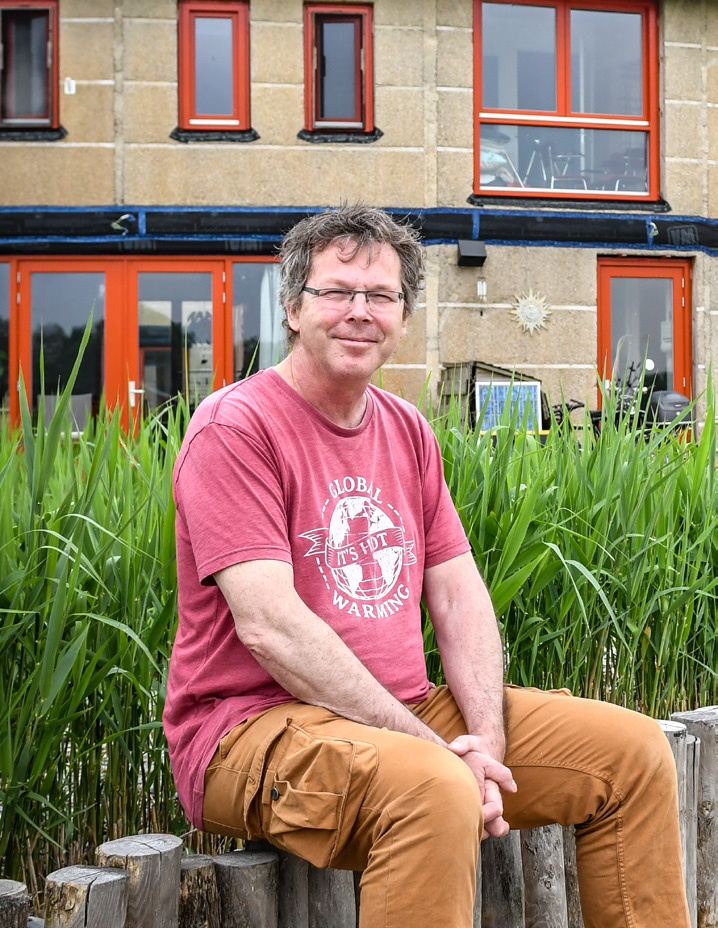Question#1 What was your company’s distinctive strategy for incorporating technology to meet UN Sustainable Development Goal?
We strive to use collectively shared technology and use as few rare earth metals in our technology as we can to save the environment and resources. That is best seen in the innovative CESAR heating system we tested that is based on storing summer heat in steel waste. It is not connected to the grid, so everyone who uses this system will not have an energy bill to heat their houses in the winter. Our collective heating system for 36 houses uses less rare earth metals than two regular heat pumps. And it can easily be upscaled to 500 houses without adding much extra rare earth metal. This low-tech system can be used all over the world and can even be used with materials that are from the region, like rocks or sand. This system ensures access to clean and free energy (SDG 7).
Question#2 What challenges did you face while working on your project/ initiative, and how did you overcome them?
We have a social housing project that can show how humans can live sustainably even when they don’t have a lot of money. Our biggest challenge was getting finance to build the 36 houses, we even had to go to a bank in another country to get a loan. Our project had so many innovations that it didn’t fit into any Dutch bank’s risk model. A German bank saw little risk. Now we have made sure that the rental income of our houses that is left after the bank is paid off will always be used to finance similar starting communities. So, after 30 years we will lend €300,000 each year to start sustainable communities with zero interest.
We not only overcame our biggest challenge, but we have also solved it for future communities! This will help to reach SDG 11 and make cities and communities inclusive, safe, resilient and sustainable.
Question#3 How did you involve local communities and stakeholders in your work, and what was their response?
Ecodorp Boekel is an ecovillage, a local community and we work together with other ecovillages in the Netherlands, Europe and even worldwide. We are part of a worldwide project to prepare local communities for a global temperature rise of 2.5 degrees and more. We try to share all the knowledge we have in as many languages as we can through our website, and we are now developing a platform called the Global Goals Community where open-source solutions are gathered with step-by-step instructions to be used all over the world. Other stakeholders are very happy about our high ambition on each of the SDGs and are glad to work together with us to make the world a better place. We work together with several ministries, our province and several universities to act as a Living Lab.
Question#4 Which organizational skills and assets can be harnessed to provide its goods/services without negative environmental and social impacts?
Don’t do that. Don’t aim for the low bar of not having a negative impact. With everything we do, everything we buy, and everything we produce, we aim to have a positive environmental and social impact. For example, we grow food that is free for the inhabitants of our community, we have hundreds of different crops, so the season in which bees and butterflies can find flowers is widened.
In Ecodorp Boekel, we use as many ecosystem services as we can to strengthen our natural surroundings. We have a biodiversity plan that is so good that our province promised they would connect us to the National Conservation Area next to us. Then we will have proven that humans can have a positive impact on their natural surroundings. We were even asked to give a presentation about our relationship with nature to the EU in 2022.
Question#5 What is the role of businesses, governments, and civil society in achieving the SDGs, and how can they work together?
We have to work together. We need all hands on deck to regenerate this world. In the last 150 years, we have made some huge mistakes that are threatening to make our planet a hostile environment for humankind. First, we have to stop working with, buying from or funding businesses that have a negative impact. And we each have to find ways to work that are a win for ourselves, for the partners we work with, for nature and for future generations. If businesses, governments and civil society all do that, we will reach the SDGs! This is not an unreachable dream.
We have already realized this in Ecodorp Boekel and there are 100,000 ecovillages all over the world that can show you how it can be done. There is an ecovillage in your area, visit it and work together with it to make your region more sustainable.
Question#6 What impact has your project had, and what are your future goals?
All elected officials of our province visited us and afterwards invested 1-2 million euros in us because they want the rest of the citizens of our province to live like us in 2050 and see us as a showroom.
More than 15 directors of Dutch ministries have had a guided tour of our ecovillage on various occasions. We received three sustainable building awards and Ecodorp Boekel has been declared the most sustainable organization in the Netherlands in 2021/2022 by the Dutch building sector. We were asked to give the closing keynote speech of an EU symposium on the circular economy in practice. We got an exemption from the Dutch building code and what we tested was added to the building code. We changed a law!
Our future goals are to spread the knowledge of ecovillages to as many people as we can and to be an inspiring example of sustainable living.
Question#7 What advice do you have for individuals/organizations seeking to create positive change and contribute to the SDGs?
Aim as high as you can, because high ambitions will attract partners with similar ambitions and even funding. Or find partners or businesses that have the highest ambition and work with them. Together, you can reach your ambitions easier. If you want to test an innovative product you made, find an ecovillage in your region and ask them to test it out for you.
Ecovillages exist only for people who want to live sustainably. Start today because it will be worth it. You will find your life enriched when you surround yourself with people with high ambition who strive to make a positive impact.
Question#8 How would receiving this SDG Award help you improve your impact and scale your project?
Having won the SDG Award will give us recognition to get our new platform the Global Goals Community going faster. SGD 11 is about making cities and communities inclusive, safe, resilient and sustainable. The Sustainable Development Goals have focused for too long on only governments. We want to encourage citizens and citizens led initiatives to help governments reach these goals. So, do you want to make your house, your garden or your community a better and more resilient place? Go to the website www.globalgoalscommunity. eu and find free step-by-step solutions to reach all of the SDGs.






















